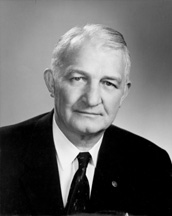W. Chapman Revercomb
William Chapman Revercomb (born July 20, 1895 in Covington , Virginia , † October 6, 1979 in Charleston , West Virginia ) was an American politician ( Republican Party ) who represented the state of West Virginia in the US Senate .
Revercomb began studying at Washington and Lee University in Lexington , which he interrupted to join the US Army and fight in World War I. He resigned with the rank of corporal and returned to the United States, where he continued his studies at the University of Virginia , graduating in 1919. He practiced as a lawyer in Covington until he moved to Charleston in neighboring West Virginia in 1922.
In 1942 Revercomb was elected for the first time for the Republicans in the US Senate, where he prevailed with 55.4 percent of the vote against the Democrat Matthew M. Neely . After President Harry S. Truman took office , he made a name for himself in Congress as an opponent of its foreign and domestic policy and as a staunch advocate of civil rights . After losing re-election, he had to cede his Senate seat in 1948 to the now victorious Neely; also in 1952, when he applied for the second seat of West Virginia, he was defeated - this time against Harley M. Kilgore .
It was not until 1956 that Revercomb managed to return to the Senate through a by-election. He defeated William C. Marland and then took the place of the late Harley Kilgore, whose mandate had previously been provisional to William R. Laird . After two years in office, he had to face the regular election, in which he lost to Democratic Congressman Robert Byrd . Byrd subsequently defended this Senate seat for his party until his death in 2010; the following by-election won Joe Manchin again as a Democrat. Revercomb is the last Republican to date to represent West Virginia in the Senate.
After he failed to become a Republican candidate for the gubernatorial election in West Virginia in 1960, W. Chapman Revercomb withdrew from politics. He worked again as a lawyer in Charleston until his death in 1979.
Web links
- W. Chapman Revercomb in the Biographical Directory of the United States Congress (English)
| personal data | |
|---|---|
| SURNAME | Revercomb, W. Chapman |
| ALTERNATIVE NAMES | Revercomb, William Chapman (full name) |
| BRIEF DESCRIPTION | American politician |
| DATE OF BIRTH | July 20, 1895 |
| PLACE OF BIRTH | Covington , Virginia |
| DATE OF DEATH | October 6, 1979 |
| Place of death | Charleston , West Virginia |

